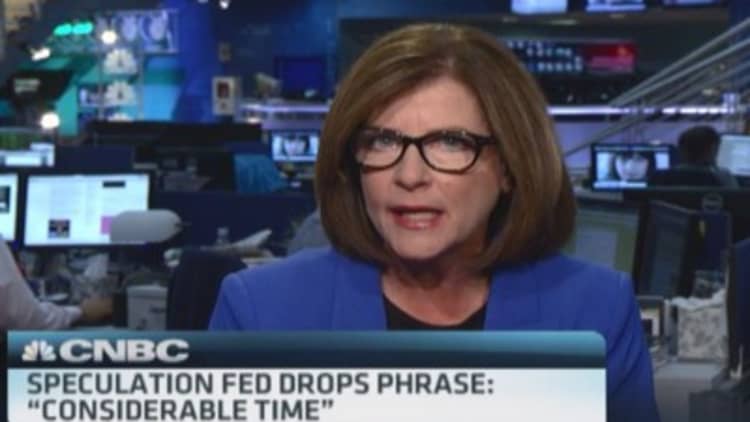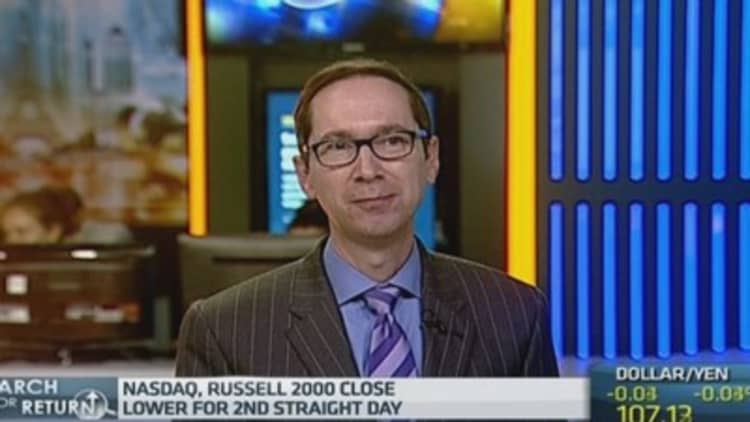The Federal Reserve could change the calculus for markets with just two words.
The phrase "considerable time" was added to the Fed's statement earlier this year, when it wanted to reassure markets that when quantitative easing ends it would hold rates lower for longer—an eternity to stock and bond traders.
Now, the Fed's quantitative easing, or bond-buying program, is coming to an end, and the economy is improving. So Wall Street has read into recent comments of several Fed officials that the Federal Open Market Committee could drop those two words when it meets this week. It may also use the opportunity of Fed Chair Janet Yellen's press conference at 2:30 p.m. ET this afternoon to make sure the markets are hearing the right message.
"It's kind of threatening here. We've had the biggest bond market sell-off since last November/December, so it's a big deal," said Chris Rupkey, chief financial economist at Bank of Tokyo-Mitsubishi UFJ. "We're hanging in here at the high point. We're not backing off. The market is petrified they're going to drop the worlds 'considerable time' and yields shoot higher. I think they could."

Mesirow Financial chief U.S. economist Diane Swonk sees a 45 percent chance the Fed drops the 'considerable time' language.
"The biggest mission for Janet Yellen is to start to pave the road ahead of the exit. It's a gradual exit. Gradualism is what she'll emphasize," Swonk said. "I think it's early to take out the 'considerable time' language."
Swonk said the Fed is also not likely to alter language about slack in the labor force despite some speculation it might drop the comment about "significant underutilization." She said markets will also focus on where the Fed sees a neutral Fed funds rate. It was at 3.75 percent, and with the inclusion of 2017 forecasts it could actually drop to 3.5 percent.
Granted, the words "considerable time" are somewhat vague, but the markets already seem to have a variety of interpretations.
"All of this is about people reading tea leaves," said Ethan Harris, co-head of global economics research at Bank of America/Merrill Lynch. "The problem for the Fed is they've entered the new world of forward guidance, and they don't really know where they're going.... Now that they're getting close to the end and they're trying to fine-tune that guidance, we're finding out the limits of it."
Goldman Sachs Chief U.S. Economist Jan Hatzius said that if the Fed does drop the two words from the phrase—"considerable time after the asset-purchase program ends"—or replaces them with something weaker, it will have changed policy by declining to extend its existing guidance or reneging on guidance.
Read MorePimco's best investment ideas right now
"If they took ['considerable time'] out, the market would say there's a much higher probability, not a certainty…but a much higher probability you would get a hike early on and the March FOMC meeting is in play," Hatzius said. He does not expect the Fed to drop the phrase but says it could alter it by dropping the caveat "after the asset-purchase program ends," while keeping "considerable time."
J.P. Morgan chief U.S. economist Michael Feroli has expected the "considerable time" language to be changed but today he issued a note saying disappointing CPI inflation data could bring that into question. "However, given the magnitude of the miss, if it is a very close call inside the Fed's boardroom today, then perhaps this number could sway some undecideds toward a cautious approach: leaving 'considerable time' in the statement," he said in the note.
The asset purchases are expected to end in November, after the central bank announces the last step to reduce, or taper, the program next month. So the Fed does not need to change the language yet. Markets have been expecting a rate hike at some point next year, and several Wall Street economists in the past week moved their forecast up to an initial rate hike in June from September.
"I would say the markets have decided this means that basically the Fed is off the table for six months after the end of tapering, so you can count down from October, six months from there and you basically don't have to worry about the Fed doing anything," said BofA's Harris. "I don't think that's what the Fed means, but that's what the market has decided. Any change to that language creates nervousness, and who knows what the language means? Do they mean six months, or something longer or shorter? The bond market likes rules they can grab on to."
Read MoreWhy Obama, Dems are in deep trouble on economy
Harris expects the Fed to drop the language, but it may add more language to highlight that it's looking for a "considerable" improvement in the economy. He said several Fed officials have indicated they object to the focus on the calendar, implied by "considerable time," and their comments have fueled the debate on Wall Street.
"I'm expecting them to word it in a way that would probably be greeted with pretty minor response in the market," he said.

Goldman's Hatzius said markets believe that the term "considerable time" in an FOMC statement means six months, or at least six months. He said this belief goes back to the 2004-06 rate-hike cycle. From August to December 2003, the Fed had the phrase "policy accommodation can be maintained for a considerable period" in its statement. The FOMC removed the language in January 2004 and hiked rates six months later, in June 2004.
Yellen cemented the idea when she said in testimony earlier this year that the Fed could consider hiking rates six months after its bond-buying program ends, and while Fed officials have pushed back on that comment, the markets still believe it, Harris said.
Read MoreCramer:Tech investors facing Alibaba headache
"She's probably going to come out in the press conference and say this is not a substantive change in our view," Harris said. "When you think about it, it's pretty early for the Fed to signal the rate hikes are coming. We just had an awful first quarter of growth and we think we had two good quarters in a row, but we only make up for the weaker star."
He added: "How confident is the Fed about that after being wrong for five years in a row on growth? I think she wants to wait, and I certainly think if there's a significant language change … she's going to use the press conference to calm everyone down."
Read MoreWhat to REALLY look for in Yellen's words
—By CNBC's Patti Domm.


